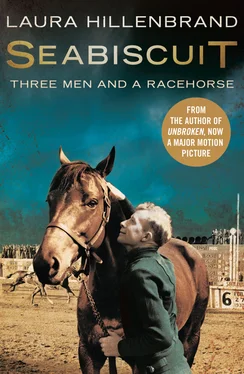The days of large life and uncomplicated success were fleeting. For Woolf, the longest shadow on his life surfaced a few years into his career. Its most evident manifestation seemed innocuous enough: Woolf was prone to nodding off. He would spend his days off stretched out in bed, snoozing. At parties, he was known to fall asleep in mid-conversation. His wife, Genevieve, and his friend Bill Buck were so concerned about his sudden attacks of sleep that they chauffeured him everywhere. Between races, Woolf climbed atop the jockeys’ lockers and curled up in the arms of Morpheus. He took napping so seriously that he eventually staked out a secret nest on the track roof, tucked in behind a chimney. Roused as the jocks’ room custodian shouted the traditional prerace call of “Jockeys! Jockeys!” Woolf would slip downstairs, wake himself with a tall Coca-Cola spiked with a couple of drops of ammonia, blot his lips, mutter, “Let’s go get this money and go home,” and stride into battle.
To almost everyone in the jockeys’ room, Woolf’s perpetual sleepiness was just another of his many eccentricities. To Woolf, Genevieve, and a few close friends, it meant something entirely different: insulin-dependent, Type I diabetes.
His disease apparently surfaced in 1931, shortly after Caliente opened. Diabetes has never been easy to live with. In the 1930s it was hellish. Insulin had only been discovered about a decade before Woolf’s diagnosis. Glucose levels were monitored by testing urine, which could only measure glucose present in the blood eight hours earlier. Trial and error was the only method physicians had to figure dosage, additives had not been developed to improve the absorption of the hormone, and the proper diet for diabetes management was not yet fully understood. As a result, patients like Woolf could never truly control their illness. Giving himself repeated daily shots of canine insulin in the abdomen, arm, or leg, Woolf almost certainly spent his days boomeranging between insulin gluts and deficits. The result was frequent sickness—nausea, vomiting, extreme thirst and hunger—occasional irritability, and exhaustion.
Конец ознакомительного фрагмента.
Текст предоставлен ООО «ЛитРес».
Прочитайте эту книгу целиком, купив полную легальную версию на ЛитРес.
Безопасно оплатить книгу можно банковской картой Visa, MasterCard, Maestro, со счета мобильного телефона, с платежного терминала, в салоне МТС или Связной, через PayPal, WebMoney, Яндекс.Деньги, QIWI Кошелек, бонусными картами или другим удобным Вам способом.











